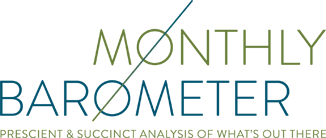Weekly Selections from Monthly Barometer
Weekly Selections from Monthly Barometer
-
Author : Thierry Malleret
Date : April 27, 2014

5 insightful op-eds or articles to help make sense of today’s world
Martin Wolf, “A More Equal Society Will Not Hinder Growth”
(Financial Times, April 24, 2014 – metered paywall)
This is yet another review of Piketty’s much celebrated book (“Capital in the 21st Century”). The FT’s economics editor focuses on the economic aspects of inequality and explains why it damages the economy (IMF research shows conclusively that lower net inequality drives faster and more durable growth). He argues that efforts to remedy inequality are, on the whole, not damaging to the economy.
http://www.ft.com/intl/cms/
Andrew Sheng and Xiao Geng, “Re-Governing China”
(Project Syndicate, April 24, 2014)
The distinguished fellow and the head of research of the Fung Global Institute discuss the mind-boggling complexity of the reform package just put into place by the Chinese authorities. They end on an optimistic note, but it’s hard not to think about the many pitfalls associated with such a complicated process, with so many different objectives, sometimes conflicting with each other.
http://www.project-syndicate.org/commentary/
Thomas Friedman, “How to Get a Job at Google”
(The New York Times, April 19, 2014 – metered paywall)
A must-read for all those worrying about how their children are going to get a job – or for the young generation itself! This is based on an interview with Laszlo Bock, who is in charge of all hiring at Google. The bottom line: today, prospective bosses care less about “what you know or where you learned it than what value you can create with what you know”. The trait that matters the most? Grit.
http://www.nytimes.com/2014/04/20/opinion/
David Cooper “Entomophagism for All”
(Times Literary Supplement, April 24, 2014)
A philosopher reviews some recent books about how food relates to our social norms and ecosystems. One of the conclusions: we should become entomophage, i.e. eat insects. Changing our eating habits will not result from hammering home statistics about food security, obesity, conditions in battery farms, and so on. It’s about who has the best narrative, “the one most suited to inspire and catch the imagination of those whose food regime is least fixed – the young”.
http://www.the-tls.co.uk/tls/
Maria Konnikova, “How to Tell When Someone Is Lying”
(The Atlantic, April 23, 2014)
We lie all the time in almost any context. This is an article based on some recent research that debunks the myth that we can detect liars with facial and physical cues. Not quite. Surprisingly, it is unconscious instinct (discrimination in the jargon) that performs the best at detecting liars.
http://www.newyorker.com/online/blogs/mariakonnikova/2014/04/
